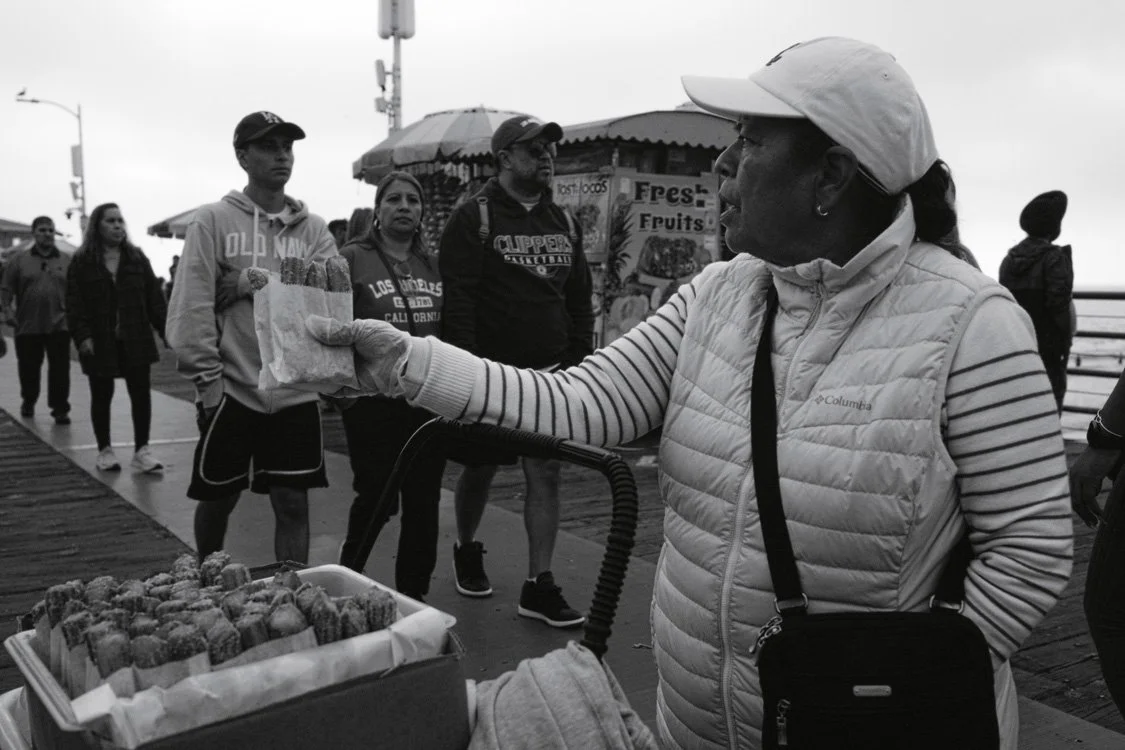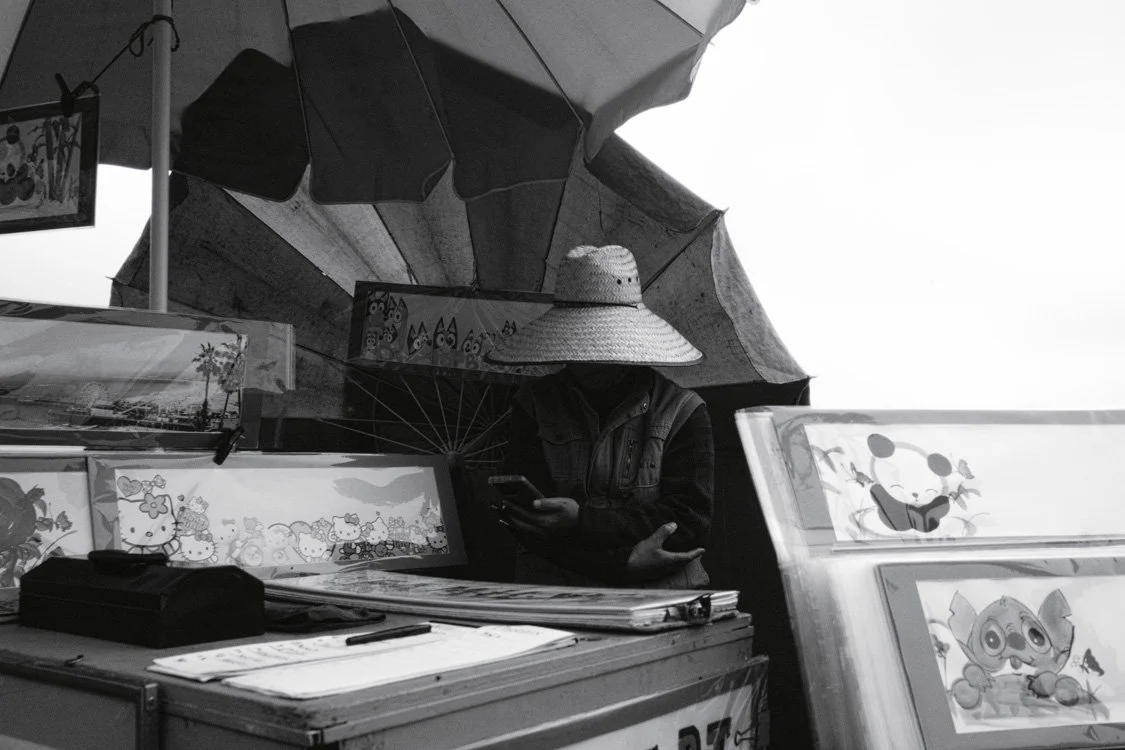Overcoming Fear in Street Photography
It’s a little bit hilarious if you think about it…
The biggest thing most of us struggle with in street photography is really just the nature of the genre itself.
Street Photography Confrontations at the Santa Monica Pier
Recently, I went out to the Santa Monica Pier with my trusty Fujifilm X100VI, took a bunch of photos of random strangers, and strapped a GoPro to my chest with the express intention to…. get into street photography confrontations.
Not because I enjoy conflict, but because I wanted to show exactly what these encounters look like, how I handle them, and how you can approach street photography with much less anxiety going forward.
Check out the video above if you’re curious to see them unfold in real time!
But for the readers out there, here is exactly, step by step, what takes me from nervous to completely fearless every time I set out to do street photography.
Why Street Photography Feels So Scary
First of all: Photographing random strangers on the street is a weird hobby. There is no way around that.
The reason street photography fear affects us is simple:
You are taking photos of people without their permission.
You are repeatedly doing something that is invasive and confrontational.
And the crazy thing is, we don’t HAVE to do this.
You could just go photograph nice mountains or cityscapes like a sane person.
But if you’re reading this, you probably feel the same magnetic pull that I do toward capturing candid life out there on the street.
The One Big Tip That Cured My Street Photography Anxiety
Alright, this is what you clicked for:
I have one main tip, plus two smaller “sub-tips”, that cured 90% of my street photography anxiety almost overnight, and has made it exponentially easier going forward.
1. Expect to “Get Caught”
Don’t just accept it, EMBRACE getting caught. You’re a part of the city and the scene as much as your subjects are, and you need to be involved in it. You can NOT hide, run, or try to be stealthy.
You don’t have to be aggressive or rude, but you do have to engage fully with the people you photograph. Lay your cards on the table with them. It’s only fair, after all. Your subjects didn’t expect to have a camera shoved in their face.
Most importantly, don’t expect them to react kindly if you come across as if you have something to hide.
If you take only one idea from this blog, let it be this:
Expect someone to stop you. Expect someone to ask why you took their photo. Expect the interaction.
This mental shift alone changed everything for me. This is the only rule you really need to follow.
And last but not least? Only take a photo when you are comfortable engaging with the subject
Avoid unsafe, clearly unstable, or heated situations (or at the very least, be confident you can diffuse them if necessary). Other than that? Have fun and focus on your compositions.
Street ethics are a topic for another article, so I’ll leave it at this for now.
The truth about street photography confrontations
I actually talk to subjects so often that I end up having way more interactions than necessary.
A common reaction I get, every time I go out, is, “Wait… you took a photo of me???”.
Probably 20-30% of the time, I find subjects will not really react, or maybe even notice me.
So what about the other 70% of the time? They tend to either embrace being photographed, strike a pose, ask to see the image, inquire about what you’re doing, or occasionally ask you to delete the photo if they aren’t comfortable with their image living on someone’s hard drive.
I’ve been doing this for years, tens of thousands of images, and I’ve only had a subject get truly angry with me… this is true… twice.
That’s because I combine the central idea I’ve covered above with the following tips to make sure that my approach results in interactions that are positive and low-tension.
And those two negative interactions? They came from me trying to hide what I was doing.
2. The Approach (Stop Hiding)
You have likely heard versions of this a million times, so I won’t linger too long here:
Do not hide your camera
Do not act sneaky or guilty
Smile, be approachable, compliment people
Be the fun, harmless person out making photos, having a good day
Make your subject feel special or important
All of this comes from confidence. And that confidence stems from being prepared to talk to people. Being in the mindset to interact and being utterly unashamed about what you’re doing go hand in hand.
The more obvious you are, the more infrequently people question you or really care what you are doing.
Do you see how, when you put these things together, they all start to work in conjunction with one another?
Almost every defensive or standoffish reaction I see in street photography comes from me messing this part up and trying to “get away” with taking the shot, being sneaky, or sometimes simply not making eye contact.
The second you avert your eyes, hide the camera, or try to scuttle off, you look far more suspicious than you really are. Remember: you aren’t doing anything wrong or mean or bad.
So don’t act like you are!!!
3. Practice and Desensitization
This one is the hardest. I’m gonna be honest. This is going to sound a lot like I’m telling you to just do it, or “pull yourself up by your bootstraps”, but it’s also inevitable if you’re really serious about pursuing street photography.
I mean, you will presumably have to go out to take a photo at some point, right??
The key thing here: The more you do it, the faster the anxiety melts away.
For me, maybe the first 2-3 shots of the day feel a little nerve-wracking. After that, the switch flips, and I remember:
Oh right. Almost no one cares.
And once you make the “leap”, that fear is gone. Your brain finally has space to think about composition, light, color, and timing, as opposed to how the subject will react.
That is when your best work starts showing up.
Final Thoughts
Street photography fear is real. It’s okay, it’s understandable. But you CAN push through it if you adopt the right approach!
Confrontation is hard for a lot of us, myself included, but the solution does not require magic, talent, some mysterious X-factor, or even extroversion.
It is as simple as this:
Expect the confrontation
Be open and obvious
Practice until it gets less scary
Do that, and street photography is one of the most freeing and exciting genres of photography there is!
It took me a long time, it might take you a long time, but anything that’s worth doing is worth doing right, and worth putting some energy into.










